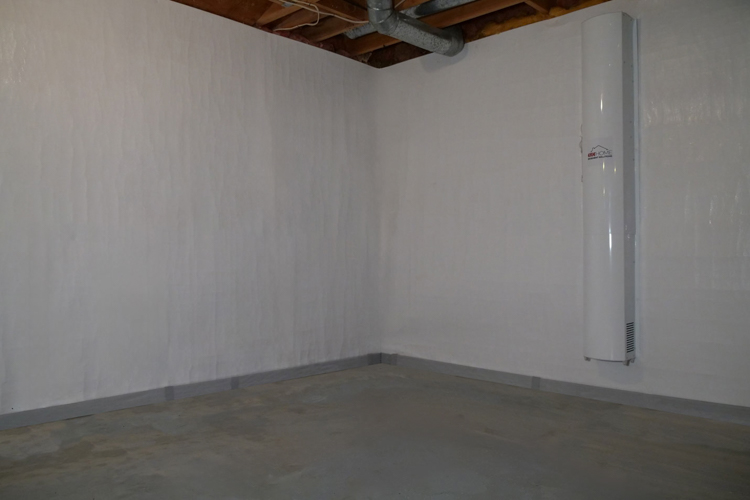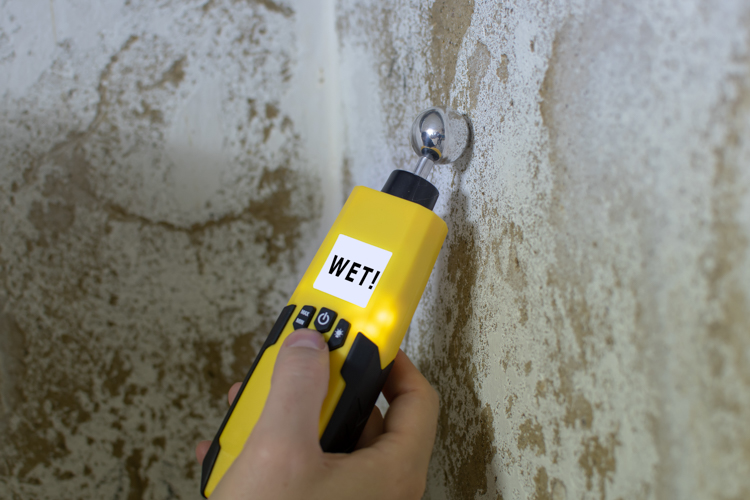A basement is full of potential. Many homeowners decide to finish their basements, using the space as a family room, home office, or bedroom. Others use their basements for storage.
Some homeowners leave this area of the home largely empty, but it is often where the hot water heater, furnace, washer and dryer, or other appliances reside.
Having moisture in your basement is a common issue. It could cause a musty smell and an unpleasantly humid feeling in the air, or it could cause water to run down the walls and accumulate in puddles on the floor.
Is basement waterproofing worth it? At Erie Home, we believe it is. Let’s take a look at a handful of reasons you should consider having your basement waterproofed.

In This Article
Consequences of a Wet Basement
If your basement is moist, there are a variety of issues that can arise.
For starters, you might notice a mildew smell, likely from mold growing on the walls, in the ceiling, or on stored belongings. Mold can cause damage to various items, such as anything made of paper, wood, or fabric. Harmful particles from mold, mildew, and other pollutants can also circulate throughout the rest of your home through your HVAC system, leading to poor air quality that’s not limited to your basement.
Mold, mildew, and other air pollutants can also cause health problems. The United States Environmental Protection Agency lists allergic reactions, asthma attacks, and eye irritation as possible effects of mold exposure. In some cases, exposure to these pollutants can cause fungal infections, leading to serious illness.

Exposure to other toxins and chemicals such as lead dust, formaldehyde, asbestos, radon, and volatile organic compounds (VOCs) from upholstery, appliances, carpeting, pesticides, and cleaning agents can cause symptoms such as headaches, nausea, fatigue, cough, and more.
In addition to health concerns, water in the basement can compromise the home’s structural integrity, specifically the foundation and walls. You might see cracks or eventually experience instability of the foundation.
This type of damage can attract pests like termites, rodents, and roaches, creating further health hazards for your family.
Benefits of Basement Waterproofing
One main benefit of waterproofing your basement is that you’ll avoid many of the consequences listed above.
If you can prevent mold and mildew growth, you’ll be creating a healthier indoor environment. You’ll also be preventing cracks and other issues that can damage the foundation and walls of the basement.
If you get your basement nice and dry, this opens up the option for finishing it to create a functional living space. In addition to giving you and your family more room to spread out, it also adds to the square footage of your home, which may raise the value of your property.
As a final benefit, if you’re planning to sell your home at some point in the future, a well-maintained basement looks more appealing and can allay the worries of potential buyers. Water damage can make people wary, so investing in basement waterproofing may have a very high ROI when listing your home on the market.
Types of Basement Waterproofing to Consider
The best way to waterproof your basement will depend on a variety of factors. A professional basement waterproofing company like Erie Home will be able to advise you on the type of treatment your basement needs.
In some cases, interior encapsulation or coatings might be enough to create a barrier against water penetrating the walls. Other times, pre-existing damage may require foundation repair and other exterior work.
Grading your property and setting up exterior drains can divert water away from the foundation, significantly reducing the chances of water infiltration.
Interior drains and sump pump installation are ways to remove water once it enters the space. These methods alone don’t fully waterproof a basement, but they do eliminate standing water and minimize the risks of a wet basement.
Final Thoughts
If there’s moisture in your basement, it’s a good idea to weigh the costs of basement waterproofing against the risks of allowing water to continue to infiltrate and accumulate in the space. Since the risks of leaving a basement damp can be severe, basement waterproofing is the best approach.
Erie Home provides free consultations on basement waterproofing and recommends the best waterproofing methods and preventive measures for your home. Our technicians are experts in their field, and we use the best products available that meet the industry’s highest standards.
In addition, our basement waterproofing services come with a 25-year warranty, with a free inspection after the first year, so you can rest assured that your basement will remain dry over time.
Don’t wait for mold and mildew to overwhelm your home and create health risks for your family. Call us today at 1-800-998-8301 to learn how we can help, or request a free inspection and estimate.
Frequently Asked Questions
What are the disadvantages of basement waterproofing?
The main disadvantages of basement waterproofing are the cost and time involved. If you hire Erie Home to manage this for you, you’ll save time you would have otherwise spent doing it yourself—plus, you’ll have the peace of mind of knowing that the project was handled by experienced professionals.
Erie Home also offers affordable financing options. Don’t let the cost stop you from protecting your home and your health.
Can I waterproof my basement myself?
Yes, it’s possible to do some basement waterproofing on your own if you have the skills, tools, time, and experience. A wet basement can lead to structural damage or other complications, so it’s best to consult a professional.
Can you finish a basement without waterproofing?
If you don’t have any active leaks, cracks in the walls or foundation, or other indications of water entering your basement, you can finish the space without waterproofing it first. However, waterproofing your basement is always recommended before making the investment to finish it. Otherwise, there’s a risk of later basement leaks and moisture issues that can ruin your finished walls, flooring, furniture, and any other items stored in your basement.
Does waterproofing a basement add value?
Yes, waterproofing your basement can add value to your home as it prevents costly damage that can result from leaks. It also allows you to finish your basement to create a functional living space without worrying about leaks damaging the walls, furniture, and décor. A finished basement adds square footage to your home, which also increases the property value.
Which waterproofing is best for my basement?
The type of waterproofing that’s best for your basement depends on how much water is coming in, how it’s getting in, whether your foundation is in good condition, whether your property is adequately graded, and a host of other factors.
Contact Erie Home for a free consultation so we can go over the best options for your home.